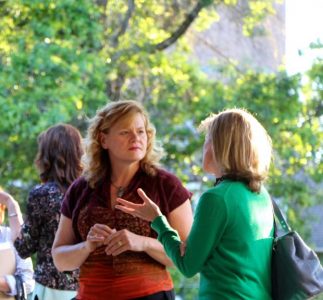
Medical care for children with chronic conditions, particularly for those with neurodevelopmental conditions, can be very complex. There are significant advantages to incorporating digital tools into the medical care of children and youth. At the Apps4Kids Hackathon, held at UBC, paediatricians, parents, designers and students collaborated for a week to create apps that will improve children’s health.
To open the event, doctors, scientists and parent advocates presented medical problems that could be solved with web-based tools, hardware or software. Over the course of the week, over 70 students, professionals, and parents came together in teams to work on the projects. The apps were programmed over an intensive two-day period. During the rest of the week, family and patient representative suggestions were incorporated in the app development during feedback sessions, and by inviting parents and patient advocates to consult on the projects. Sessions were also held over the week to discuss important ethical and community considerations with parents and advocates. Dr. Amy Salmon, from CanFASD, spoke about the value of monitoring medication use through apps; Dr. Nina di Pietro, from The National Core for Neuroethics, discussed the essential ethical questions related to engaging patients and collecting data; and Kirsten Graham, parent advocate with the Children’s Sleep Network, discussed the benefits of making a learning community with parents to ensure digital tools address patients’ and family’s needs. Dr. Osman Ipsiroglu from the Sleep/Wake-Behaviour Clinic and Research Lab sees real potential in this approach. “Modern data gathering apps will support bi-directional communication and increase quality of care,” says Dr. Ipsiroglu.
Students had the opportunity to apply their technical skills to real-world, app development, and work in a team-oriented environment with mentors from a range of backgrounds. The event served to connect technical programmers/developers with the clinicians who needed their help; several viable products were created, and some students will continue working with their group leaders to refine the products. “It is always astonishing how much can get done at a hackathon. It’s great to see students working outside the classroom, alongside clinicians, medical researchers and parents,” says Dr. Cristian Grecu, Electrical and Computer Engineering.
Apps4Kids Hachathon PROJECTS
Down Syndrome Medical Care App & Sleep/Wake Behaviour App with Medication Module.
An app to support parents, caregivers and professionals in tracking the health needs, e.g. sleep patterns and medications, of children with neurodevelopmental conditions, particularly Down syndrome. “With a medical care app for individuals with Down syndrome, we expect to see better information collection and hope to increase the autonomy of patient families,” says Ms. Dawn McKenna, Executive Director of the Down Syndrome Research Foundation.
Growth Plot. Growth Plot allows parents and doctors to track and share information about a child’s growth and plot it on a chart containing standardized World Health Organization curves.
Printing your name like a pro! An app to support children with printing difficulties to write their name. This project is the technological transformation of a paper-based solution that is based on motor learning theory and current evidence.
Inpsired Patient. Inspired Patient is a web platform for improving patients’ health journey! Targeting parents and parent caregivers, and their professionals, this platform provides information, organization and collaboration tools to better managed the health journey.
Medical Genetics for UBC, Discourse Interaction Development. This project focuses on creating a new social forum for students in UBC Medical Genetics to engage in discussions. This project is part of UBC Medical Genetics curriculum renewal program to improve student learning outcomes with online active learning components
Portable EMG-Video App. This project consists of both hardware and software components, and focused on building a user-friendly EMG device with integrated video capture that can be used as a clinical tool for the assessment of restless legs syndrome.
Down Syndrome Sleep Learning Module. This project is an interactive web-based tool that incorporates real case study encounters and allows students “to play a role” in the care of a complex virtual patient with Down syndrome and associated medical problems, including chronic sleep problems.
The Apps4Kids Hackathon is a collaboration between The Sleep/Wake-Behaviour Clinic and Research Lab, the Department of Paediatrics, BC Children’s Hospital and The University of British Columbia’s Department of Electrical and Computer Engineering along with The Child and Family Research Institute and NeuroDevNet, a Centers of Excellence Network, and service-providing non-governmental organizations such as the Down Syndrome Research Foundation, and the Canada Fetal Alcohol Spectrum Disorder (CanFASD) Research Network.
